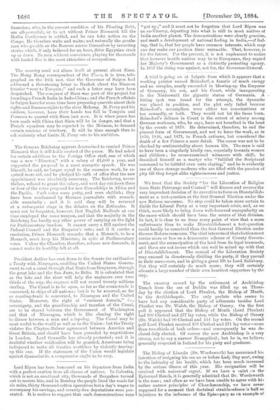A trial is going on at Leipsic from which it
appears that a working printer named Reinsdorf, a fanatic of much energy and no scruples, nearly succeeded in blowing-up the Emperor of Germany, his son, and his Court, while inaugurating in the Niederwald the gigantic statue of Germania. A fitting spot was found for the attempt, the dynamite was placed in position, and the plot only failed because Reinsdorf's accomplices were either too conscientious or too cowardly, or both. They would not let the fuses burn. Reinsdorf's defence in Court is the extent of misery among German workmen, who, he says, have not benefited in the least by the events of 1870. He determined, therefore, to end the- present form of Government, and not to leave the work, as in 1830, 1818, and 1871, to French artisans, but considered the- death of a few Princes a mere detail. The cause was not to be checked by sentimentality about human life. The man is said to have been a singularly kindly one, especially towards women and children ; he cross-examined witnesses with skill; he- described himself as a martyr who "fulfilled the Scriptural command to be faithful even unto slaying," and he is evidently one of those strange moderns who are filled with the passion of pity till they forget alike righteousness and justice.






































 Previous page
Previous page